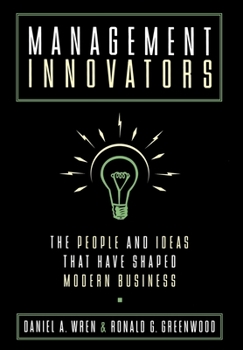Management Innovators: The People and Ideas That Have Shaped Modern Business
Select Format
Select Condition 
Book Overview
Here is a who's who of business, thirty-one profiles of inventors, financiers, organizers, motivators, and gurus--a vivid, informative look at the history of management as seen through the lives of its most influential figures.
We meet Eli Whitney, creator of the cotton gin and father of the machine tool industry, who failed to profit from his genius; Thomas Edison, who once vowed he would never invent anything he couldn't sell; and Andrew Carnegie,...
Format:Hardcover
Language:English
ISBN:0195117050
ISBN13:9780195117059
Release Date:April 1998
Publisher:Oxford University Press
Length:272 Pages
Weight:1.25 lbs.
Dimensions:0.9" x 6.4" x 9.5"
Customer Reviews
2 ratings
An Exceptional 30
Published by Thriftbooks.com User , 22 years ago
Wren and Greenwood have written one of the most informative I have read in recent years. With brevity but precision and insight, they examine 30 people who have indeed "shaped modern business." The excellent material is presented within 12 chapters which range from "Inventors" (Eli Whitney and Thomas Alva Edison) to "Guru" (peter F. Drucker).. Along the way, they discuss a number of especially influential persons about whom many readers probably know little (if anything), such as Alexander T. Stewart, James J. Hill, Ezra Cornell, Lillian and Frank Gilbreth, Chester I. Barnard, and Mary Parker Follett. All by itself, the Introduction is well worth the cost of the book. Near its conclusion, Wren and Greenwood observe: "Taken as a whole, there is no single theme to this book; rather, it is a narrative with multiple themes as a story of American business enterprise unfolds. Beginning with the selection of inventors, we see how the process of invention and innovation changes the way we live, creates entirely new industries, and must be continuous as the competitive environment changes. Makers [e.g. Henry Ford] are those who who change ideas into markets for the marketplace -- an evolutionary process that accompanies the shift from small-to-large-scale manufacturing and then to the assembly line. Sellers [e.g. Richard W. Sears] take those products to market and allow us to see the sales and distribution innovations that have enabled modern consumers to live better than the monarchs of centuries before. Inventors, makers, and sellers need the movers [e.g. Edward H. Harriman], those who create the time and place utility; and all need the communicators [e.g. Alexander Graham Bell], who connect the parts into a whole."Because this book was first published in 1998, many readers (I among them) would have expected the inclusion of other "management innovators" such as Donald Dell, Walt Disney, Bill Gates, Sam Walton, and Jack Welch. Perhaps they will be among those discussed in a sequel to this volume. Nonetheless, each of the 30 whom Wren and Greenwood do include is eminently worthy. Those who share my high regard for this book are urged to check out Stuart Crainer's The Management Century, James Tobin's Great Projects: The Epic Story of the Building of America, from the Taming of the Mississippi to the Invention of the Internet, and Andrea Gabor's The Capitalist Philosophers: The Geniuses of Modern Business -- Their Lives, Times, and Ideas.
History of Modern Management
Published by Thriftbooks.com User , 23 years ago
Every manager should read this illuminating and extremely important book. Daniel A.Wren and Ronald G.Greenwood give tomorrow's leaders indispensable lessons from 'the people and ideas that have shaped modern business.'They write that "our goal is to portray a selection of individuals whose ideas have made a difference in the way we teach and practice business management. In selecting these figures, we realize that it would be impossible to chronicle all of their activities; we could have chosen other individuals of equal stature as well. We have kept in mind an audience of contemporary managers, aspiring managers, and students of management who wish to gain a historical perspective on their profession by sketching the people and ideas that contributed to the formation of modern management" (from the Preface).In this context, Wren and Greenwood divide their book into two parts:* Part One- In this part, they trace the beginnings of American enterprise in inventing, manufacturing, selling, transportation, communication, and financing. They argue that these fourteen individuals set a pattern for others to follow as U.S. business enterprise grew.* Part Two- In this part, in order to portray the search for better ways to manage, they present stories of other influential individuals. Here, they argue that these representatives played a pioneering role in shaping modern managerial practices.Highly recommended.





